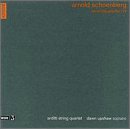| All Artists: Arnold Schoenberg, Arditti String Quartet, Dawn Upshaw Title: String Quartets 1-4 Members Wishing: 1 Total Copies: 0 Label: Disques Montaigne Release Date: 11/14/2000 Album Type: Import Genre: Classical Styles: Chamber Music, Historical Periods, Classical (c.1770-1830) Number of Discs: 2 SwapaCD Credits: 2 UPCs: 3298497821353, 713746170523 |
Search - Arnold Schoenberg, Arditti String Quartet, Dawn Upshaw :: String Quartets 1-4
 | Arnold Schoenberg, Arditti String Quartet, Dawn Upshaw String Quartets 1-4 Genre: Classical
|
Larger Image |
CD Details |
CD ReviewsAustere elegance, essential modern works R. Hutchinson | a world ruled by fossil fuels and fossil minds | 04/20/2002 (5 out of 5 stars) "The Arditti Quartet here presents all four of Schoenberg's string quartets, including the Second where they are joined by the soprano Dawn Upshaw. The quartets chart Schoenberg's path, from the late romantic, Mahleresque First, to the atonal Second, to the serialist Third and Fourth. Personally, I am far more impressed with the later works, from 1927 and 1936, than the earlier ones, from 1905-1908. While even Schoenberg's finest quartet, the Fourth, is not as amazing as Bartok's best (see my reviews), these are essential modern works, and without Schoenberg, Bartok's works would not have been possible. Dawn Upshaw is sublime on the Second Quartet, singing the Stefan George poem "Transport," with the line "I feel the air of another planet," in German of course. I must say that I am just not that moved by the vocal works of Schoenberg and Webern. This disc contains a sufficient amount of expressionist soprano (the third and fourth movements of the Second Quartet) for me -- much more and I start to cringe. As with Webern's "Passacaglia," I see Schoenberg's First Quartet as interesting mainly for what it shows of his development. It's the second disc, the serial works, that are the major accomplishments here, and Arditti performs them with panache!" Some problems with the quartet as document scarecrow | Chicago, Illinois United States | 03/17/2005 (5 out of 5 stars) "The fact that Schoenberg played violoncello and had some affinity for the string timbre doesn't mean much.He was an amateur pianist yet came to write the most interesting piano solo music of the entire modernist repertoire,far more advanced than such subsequent creators as Luciano Berio or Wolfgang Rihm,who wrote no primary works for the piano.For Schoenberg It helps in the charting of upper register pencil-thin tones as in the first movement of the cubist-gestured Third Quartet. Ralph Shapey who also wrote brilliant string quartets as his Sixth and Seventh Shapey played violin. It is like knowing the subtleties and nuance of timbre of postion,placement,colour; if a tone speaks more resonantly or duller is important to modernist sensibility. Plucked tones for example in high positions have an incredible timbre.
The First Quartet is difficult to interpret,residing still in the phantasmic,it came to terms with Wagner and Mahler in many respectshence is overlong legth and the problem is in the dark concentrations, compact of countrapuntal lines.All this needs to be heard and balanced,diluted down. If not handled sensitively the quartet can simply melt itself together, blending to "globs" and wrongheaded swabs of thick string sound. Arditti sees these problems and have a third person-like sensibility to the early modernist repertoire. It seems it is difficult to play this,but they keep the lyricism always directed forward,compellingly,there are definitely dead areas in the First Quartet here that find no interesting way of playing it,or getting the work off the ground;although their Berg(who has similar problemsalthough less so) renditions are extraordinary. Likewise the innovative(with the voice) Second Quartet has a more linear ambience,threadbare tones so not to interrupt the soprano tones.Ferneyhough(a flutist) has also followed this genre compelling in his Fourth Quartet.(No one else it seems,not Carter or Rihm,other of those composers who have a sustained interest in this genre) The Third Quartet here is the most advanced of the four. The opening "cubist" like alternating ostinato,thirds and major sevenths tossed between the four players.The modernity of the work reveals itself in the exposed lines making all registers speak in differing timbral voices,much more rich and diverse than the other quartets.Here is where the accompaniment comes to be overdetermine the proceedings,pushing its function.You have this heavy welter of activity(running eigtht notes) with single pencil thin lines in the First Violin quite beautiful,and like the melos is languid,abandoned for times alone,cold against the other parts. When Schoenberg came to USA shores in 1933 escaping from the Nazi tyranny,he was met by the young Milton Babbitt in New York. Schoenberg thought he needed to transform his music due to the open-ness or new formative realities of his new home. His music to my mind simply became more stratified,one-dimensional,impersonal,thid person,perhaps an adequete reflection of his life document like. His sterile-like facile "Piano Concerto"is another example (this relative to his other powerful music).The Fourth Quartet was like a mirror of someone confused in a new land, an exile not knowing (nor anyone else) the future of culture, of German culture and European." |

 Track Listings (8) - Disc #1
Track Listings (8) - Disc #1